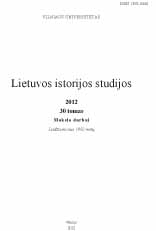TOTALITARIZMO POVEIKIS DEMOKRATINIAMS PROCESAMS: VYRIAUSYBIŲ KAITA LATVIJOJE 1926–1927 METAIS IR IŠORĖS VEIKSNYS
Influence of totalitarianism on the democratic processes: changes in the Latvian government in 1926–1927 and the external factor
Author(s): Zenonas ButkusSubject(s): History
Published by: Vilniaus Universiteto Leidykla
Summary/Abstract: Causes of the fragility of democracies of interwar European states are intensely explored not only by historians, but also by political scientists and sociologists. However, the influence of totalitarianism on democracy in those times has almost not been addressed. The article develops this subject while analysing attempts of the Soviets at the end of 1926 to trigger the replacement of the uncooperative right-wing Latvian government by a more compliant Cabinet of Ministers led by social democrats. The replacement was probably inspired by Stalin acting together with B. Stomoniakov and S. Aralov, members of the board of the People’s Commissariat for Foreign Affairs, and was executed by the Soviet Embassy in Riga through close links with Latvian left-wing social democrats. Incited by the Soviets, there was a six-week obstruction in the Latvian Seimas, which accelerated the collapse of the A. Albering government. Urged by the Soviets and tempted with economic concessions and large trade orders, social democrats formed a new Cabinet of Ministers. The Soviet project to replace the Latvian government posed a threat to the independence of Latvia. The collaborative left-wing social democrats not only were willing to accept economic concessions, but also were considering Latvia joining the USSR. Soviet politicians were probing the possibility, at the request of the left-wing government of Latvia (via the traditional export of revolution), to provide it with military support. The new social democrat cabinet initiated a non-aggression pact with the USSR and signed a trade agreement which was useful to the Latvian economy, but at the same time it allowed the Soviets to extract political concessions. Latvia’s closer economic ties with the USSR were disrupting the unity of the Baltic States, especially hampering the realization of the Latvian–Estonian customs union. The activities of the Latvian government led by social democrats did not meet the expectations of the Soviets. In their opinion, Latvia did not distance itself sufficiently from the policies of Poland and Western countries and did not fully turn into Moscow’s orbit. The implementation of the deal with left-wing social democrats was delayed in the democratic procedures of the Latvian political process. The LCDP right wing resisted the pressure of the left wing, the Democracy Center, which took part in the government, opposed the unreasonable alliance with the USSR, while the Seimas effectively controlled the activities of the Cabinet of Ministers. Thus, the external impact was absorbed by the functioning democratic system. This single-case study highlights the advantages of democratic governance, but it also shows that this governance has no external impact prevention mechanism. However, no matter how perfect the democratic procedures might be, they have no “natural immunity” to external influences. It must be built.
Journal: Lietuvos istorijos studijos
- Issue Year: 2012
- Issue No: 30
- Page Range: 92-116
- Page Count: 25
- Language: Lithuanian

